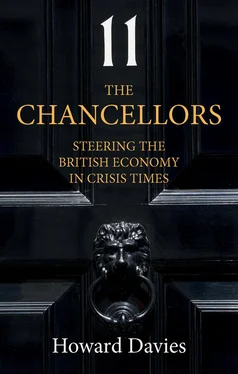The clearest immediate impact of Brexit was a sharp fall in sterling. Between May and September 2016 sterling dropped from €1.31 to €1.11. That suggested a market view that the UK’s growth prospects had deteriorated. But contrary to the Treasury’s 2016 forecasts, the domestic economy continued to grow, fuelled by an increase in consumer spending financed in part by a dramatic fall in the saving rate, from 10% in the second half of 2015 to around 4% by the end of 2016, and in part by rising nominal wages, which returned to the pre-crisis average of 4% a year. Between 2015 and 2019, unit labour costs in UK manufacturing rose by almost 10 percentage points more than in Germany, negating most of the competitive impact of sterling’s devaluation.
The most depressing observation is that productivity remained flat, and business investment was remarkably weak. The UK appears to have lost out in many of the new, high innovation, high productivity sectors. 17Investment took a long time to recover from the 2008 recession, but it grew by some 10% from 2012 to 2015. Since the referendum, it has dropped to the bottom of the G7 range and by 2019 it was 20% below what it would have been had the post-2008 trend line continued. That change in trend appears to be linked to a rise in economic uncertainty which, in turn, is linked to the referendum result and the consequential concerns about the terms of Britain’s future trading relationships with the EU and other countries. 18It is probable that, as business adjusts to a new set of trading relationships, that uncertainty will diminish, but the future course of investment remains highly uncertain.
The OBR, in its budget report in March 2021, assumes that long-run UK productivity and growth will be 4% lower as a result of Brexit, and that ‘around two-fifths of the 4 per cent impact has effectively already occurred as a result of uncertainty since the referendum weighing on investment and capital deepening’. 19By 2019, UK GDP per head was 88% of the German figure; in 2007 it had been 94%.
So in economic terms, the period ends on a downbeat note. The UK’s Covid-induced recession was deeper than average for developed countries, and the immediate recovery a little stronger. But setting that aside, the economy seemed set for a period of sub-par growth, underperforming even a not very challenging set of comparators in Europe. The Treasury can hardly be blamed for that, or for Brexit. All the Chancellors before Sunak were firmly against leaving the EU, as were most if not all the senior officials, however emotionally disengaged from the European project they might have been. It is highly unusual for a sophisticated developed economy to have its economic and trading policy upended on non-economic grounds. The verdict on the Brexit experiment will take years, if not decades, to be handed down.
The deep Covid-induced downturn was followed by a strong short-term recovery. GDP fell by a record 9.9 per cent in 2020. The recovery was expected to bring aggregate GDP back to the level at the end of 2019 by the summer of 2022. Will growth thereafter be stronger than before, allowing the two lost years of growth to be recovered? In the summer of 2021 the Bank of England, while optimistic in the short term, saw no reason to believe the trend growth rate would revert to a figure higher than had been achieved since 2009, in other words 1.7–1.8% a year. That would be a disappointing outcome.
In May 2021 the Resolution Foundation, an independent think-tank, and others launched an inquiry into the UK economy in 2030. 20The premise was: ‘The UK’s recent past has been marked by stagnant living standards, weak productivity, low investment and high inequality. This makes a new economic approach desirable.’ They present a balanced picture of the strengths and weaknesses of the UK as it emerges from recession.
On the asset side of the balance sheet, they identify a fast-growing services sector, especially insurance and other financial and business services, internationally competitive higher education, and a relatively advanced position in the necessary transition to a net zero economy. The existence of a strong political consensus on the latter point is also potentially a trump card. On the liability side, in addition to the poor investment and productivity record already discussed, they list a high degree of inequality, and an unfavourable demographic position, with the population ageing rapidly in the next decade, and Brexit likely to reduce high-skilled immigration from neighbouring countries.
Some of these factors are not susceptible to Treasury intervention. But the report identifies policy weaknesses which are potentially under Treasury control. In particular, they see ‘long-run issues with parts of our tax system, such as the relative taxation of capital and labour’, and the absence of a coherent approach to carbon taxation. (I discuss the tax system in Chapter 4.) And they conclude: ‘The UK also lacks any long-term institutional structure to govern industrial strategy. The ability of sub-national government to manage change has also been weakened, with local authority spending power in England falling by 18 per cent since 2010.’ That is important given the evidence across Europe that attempts to ‘level up’ economic development ‘are driven by regions with high human capital and high-quality local government’. 21The Treasury’s centralizing instincts, and suspicion of local government, could be serious disadvantages in pursuing a levelling-up agenda. Critics see ‘no sign the government is embracing the co-ordination needed for the moves to have a significant impact – nor any hint of further devolution of policy powers away from the centre’. 22
The stakes are high. Torsten Bell et al. conclude: ‘If the pace of UK underperformance … were to continue at the same pace in the 2020s as in the 12 years to 2019, then the country will end this decisive decade with GDP per capita much closer to that of Italy than Germany: 17 per cent lower than Germany and just 6 per cent higher than Italy.’ 23My first job on leaving university in 1973 was as desk officer for Italy in the Foreign and Commonwealth Office, as it then was. At the time, the Italians liked to talk of il sorpasso (the overtaking), the moment when their economy would overtake the UK’s. That did in fact happen in 1987, but by 2020 we were almost 30% richer per capita, after dismal performance in Italy since joining the euro. For us to fall back to the Italian level would be dramatic. Fortunately, in the summer of 2021 external forecasters expected the UK economy to grow less rapidly than France and Germany in the recovery phase, but still ahead of Italy. 24That is not, however, a high bar.
1 1. Gus O’Donnell, Angus Deaton, Martine Durand, David Halpern and Richard Layard, Wellbeing and Policy. Legatum Institute, 2014. https://li.com/wp-content/uploads/2019/03/commission-on-wellbeing-and-policy-report-march-2014-pdf.pdf. The Kennedy speech can be found at https://en.wikipedia.org/wiki/Robert_F._Kennedy%27s_remarks_at_the_University_of_Kansas.
2 2. Nicholas Crafts, The impact of EU membership on UK economic performance. The Political Quarterly, 18 May 2016. https://doi.org/10.1111/1467-923X.12261.
3 3. Dan Corry, Anna Valero and John Van Reenen, UK economic performance since 1997: Growth, productivity and jobs. Centre for Economic Performance, LSE. December 2011. http://eprints.lse.ac.uk/47521/1/CEPSP24.pdf.
4 4. Nicholas Bloom and John Van Reenen, Why do management practices differ across firms and countries? Journal of Economic Perspectives 24/1, 2010, pp. 203–224.
5 5. Nicholas Sowels, From prudence to profligacy: How Gordon Brown undermined Britain’s public finances. Observatoire de la société britannique, 2011, pp. 77–93. https://doi.org/10.4000/osb.1136.
Читать дальше









